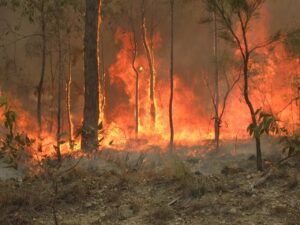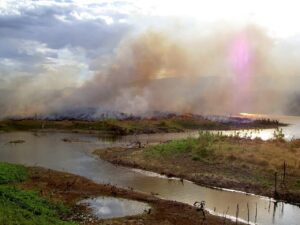Tag: burning
Bursting the PC Bubble: Wildfires Engulf Australia
by The Cowl Editor on January 16, 2020
National and Global News

Kyle Burgess ’21
News Co-Editor
With the start of the new decade, Australia continues to find itself under siege from a large swath of wildfires that continue to spread destruction across the country. The fires originally broke out in July of 2019, however the Australian government has struggled to contain the blazes despite outside assistance from American volunteers.
A total of 28 people have already died as a result of the fires and over 3,000 homes have been destroyed or damaged in the state of New South Wales (NSW) alone, making it the place that has been hit the hardest since the fires’ onset.
Many have cited extreme heat, dry-lightning, and climate change as causes for the flames that continue to envelop bushland, wooded areas, and national parks like the Blue Mountains. Additionally, NSW has charged 24 people for deliberately setting bushfires and another 183 for fire-related offenses since this past November.
It does not help that Australia is also simultaneously suffering from one of its worst droughts in history. A recent heatwave swept the country in December with some areas registering temperatures north of 104 degrees fahrenheit.
Per CNN, “Some of Australia’s largest cities have also been affected, including Melbourne and Sydney—where fires have damaged homes in the outer suburbs and thick plumes of smoke have blanketed the urban center. Earlier in December, the smoke was so bad in Sydney that air quality measured 11 times the “hazardous” level. These fires come in all shapes and sizes, enveloping isolated buildings and neighborhoods, or entire country sides.
The worst wildfire incident on record in the country remains the 2009 Black Saturday Fires in Victoria in which 173 people were killed. However, with firefighters continuing to experience difficulty in battling the flames and drier conditions expected, further fatalities and destruction are not impossible.
To Reverend Wilson Miscamble, C.S.C., these natural disasters have a personal significance. Reverend Miscamble is from Brisbane, and while his city and family have not been directly threatened by the fires, he recalled that they were on everyone’s minds while he was back home for the holidays. “The attention of all Australians was focused on the fires and the destruction they have caused. The current fires have now caused the deaths of around 30 people, including a number of the courageous firefighters battling these blazes. Additionally, there has been the loss of much livestock, wildlife, and property. Both Sydney and Melbourne (Australia’s two largest cities) have suffered from serious smoke haze.”
Despite the destruction, Reverend Miscamble cited the courage of those who chose to battle the flames. “In the midst of the tragedy of these fires what struck me most was the resilience of the Australians affected, as well as the determination of the firefighters, most of whom are volunteers, in their efforts. There was also appreciation for the international support, including firefighters coming from the U.S., to assist our local efforts.”
Aid has also poured in from Jeff Bezos who has pledged to donate $690,000 to combat the spread of the fires, as well as Brighton and Hove Albion FC starting goalkeeper Mat Ryan, who has vowed to donate $500 for every save made by a Barclay’s Premier League goalkeeper this past weekend. As the summer drags on in the Land Down Under, the Australian government will look to new strategies in quelling the flames before more magnified damage can be inflicted.
Bursting the PC Bubble: World Reacts to Recent Burnings in the Amazon Rainforest
by The Cowl Editor on August 29, 2019
National and Global News

Thomas Edwards ’20
News Staff
For nearly a month, the Amazon rainforest, the largest rainforest in the world, has had several thousand wildfires burning through it.
Wildfires are generally common in the Amazon during the dry season, which usually runs from August through mid-November. However, according to the data from Brazil’s National Space Research Institute (INPE), there has been an 84 percent increase in fires across the country from the same period last year.
What is causing this unusually high number of fires in the Amazon? Currently, there are roughly 9,500 fires burning in the Amazon rainforest. The Amazon produces larger amounts of moisture and humidity than other forests, making it more resistant to wildfires, according to the National Oceanic and Atmospheric Administration.
The first believed culprit is deforestation, according to Greenpeace. In a release on Aug. 22, Greenpeace stated that forest fires and climate change operate in a vicious cycle. “In addition to increasing emissions, deforestation contributes directly to a change in rainfall patterns in the affected region, extending the length of the dry season, further affecting forests, biodiversity, agriculture and human health,” Greenpeace stated in their release.
With deforestation fires increasing, so too do greenhouse gas emissions, increasing the overall temperature of the Earth. As the temperature increases, extreme weather events, such as major droughts, occur more often.
The second believed culprit is farmers taking advantage of the dry season to clear land for livestock and more farmland.
The farming industry and international trade are the primary drivers of deforestation in the Amazon, with more than 75 percent of it coming from cattle ranching and soy bean production — two of Brazil’s main exports.
Most of the fires currently burning across the Amazon are man-made for the purposes of clearing land for agriculture. The forest, however, is not the only thing at risk from these fires. The native wild life and native communities are in the direct path to be enveloped and consumed by these fires.
Experts and activists blame Brazilian President Jair Bolsonaro for the fires and their destruction, citing Bolsonaro’s environmental and indigenous people’s policies. Since taking office, his administration has rolled back environmental protections and cut staff from both environmental and indigenous rights agencies.
Bolsonaro recently fired the head of the INPE, due to a report released that showed higher rates of deforestation under Bolsonaro’s administration.
His administration had also cut $23 million from Brazil’s environmental enforcement agency as well as dismantled policies that protect the Amazon, instead working in favor of advancing economic priorities, such as agribusiness, mining, and fossil fuels.
According to the Articulation of the Indigenous People of Brazil, violence towards indigenous communities and their lands have been on the rise under Bolsonaro’s presidency.
Some indigenous rights groups say that Bolsonaro’s anti-environmental stances are contributing to the land disputes and violence faced by their communities. Some believe that Bolsonaro’s rhetoric about wiping out indigenous communities has emboldened people to use violence to remove Native communities from their land in order to take posession and sell it.
Experts believe that international political pressure may be the only way to stop the current devastation. French President Emmanuel Macron called for the state of the Amazon to be at the top of the agenda ahead of the G7 summit.
Early on Tuesday, August 27, Macron was joined by others in the G7 to pledge $22 million in aid to Brazil to assist in combating the fires. Bolsonaro rejected the aid, claiming Macron had ulterior motives, stating in a tweet that Macron “disguises his intentions behind the idea of an ‘alliance’ of the G7 countries to ‘save’ the Amazon, as if we were a colony or a no-man’s land.”
The Brazilian government, on top of refusing the aid, also threw in an insult towards Macron with a reference to the Notre Dame Cathedral fire in Paris this April.
“Thanks, but perhaps these resources are more relevant to reforesting Europe,” stated Bolsonaro’s chief of staff, Onyx Lornezoni, to the Globo broadcast network. “Macron cannot even avoid a predictable fire in a church that is part of the world’s heritage, and he wants to give us lessons for our country?”
The message of the Brazilian government to the rest of the world, in essence, is to mind their own business.
